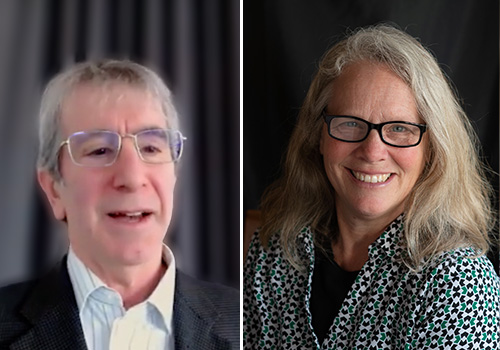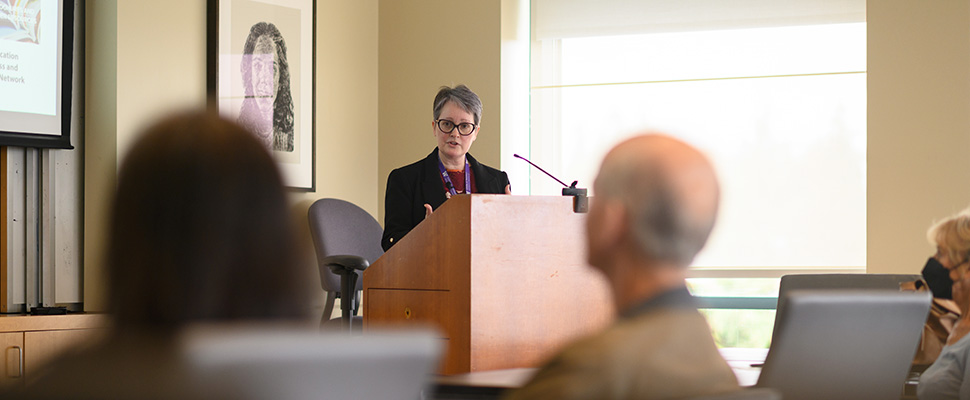Most of us know someone who’s directly affected by a neurological disorder — and, as we age, each of us is more likely to be afflicted by disorders like Alzheimer’s, Parkinson’s and stroke.
Despite the prevalence of brain disorders, few people know much about neuroscience; in fact, we often carry many misconceptions about the brain and brain health.
With this discrepancy in mind, and with the help of a $115,070 grant from the Dana Foundation, the Osher Lifelong Learning Institute at the University of Washington (OLLI-UW) and the UW Department of Bioengineering have created the Brain Health Learning Network — a first-of-its-kind program to help older adults understand neuroscientific research and raise awareness about neurological disease, mental disorders and brain health.

The program’s 13-part lecture series, which is available free online, features experts in the field of neuroscience, who lead discussions on a variety of topics related to our brains, cognitive functioning and physical health — in accessible and understandable terms.
Eric Chudler, UW associate research professor in bioengineering and the executive director of the UW Center for Neurotechnology, developed the lecture series with Natalie Lecher, the director of OLLI-UW.
Chudler’s introductory lecture, “Journey Into the Brain,” dispels some common “neuro myths” — for example, that humans use only 10% of our brains.
“If you look to Hollywood, for example, in the movie Lucy, Scarlett Johansson plays a woman who goes from being able to use 10% of her brain to 100% and begins to defy the laws of physics,” Chudler says. “People watch a movie and assume it’s true because Morgan Freeman, who plays the neuroscientist, says it, and if Morgan Freeman says it, it must be true. Unfortunately, it’s not.”
The presentation also touches on foundational terms and concepts that inform the rest of the lecture series. This “baseline of scientific knowledge,” as Chudler calls it, provides students with a framework to view the other lectures in the series and learn more about topics like dementia, sleep, concussions, stroke and pain management.
Lectures Designed by a Community of Learners
As part of developing the lecture series, Chudler and his colleagues wanted to ensure they were covering the type of neuroscientific issues that were of most interest and concern to older adults. To that end, Chudler and Lecher conducted five focus groups in the greater Puget Sound area in January 2024 and used those focus-group responses to determine the lecture topics.
"For every single lecture we’ve done so far, there’s been a statistically significant improvement in learning. It’s good evidence to suggest that the presenters are doing a good job conveying information in an entertaining way."
By involving the public, the series has helped form a “community of learners,” one of the goals of the Brain Health Learning Network. Because OLLI-UW hosted the lectures in-person in various parts of Washington before moving them online for those learning asynchronously, OLLI-UW has been able to expand across the state and region, creating meaningful engagement directly in the communities.
Armed with strengthened knowledge, OLLI-UW members can make informed decisions about brain health and critically analyze the brain health-related info they encounter in the media.
For example, when an expert on Alzheimer’s visited to deliver a lecture, Chudler recalls, there were numerous questions from participants who’d heard about a new Alzheimer’s medication in the news.
“The lecturer gave this great scoop: it’s expensive, there are side effects, it’s not a big study and we don’t know the long-term implications yet,” Chudler says. “So now community members have the ammunition, so they can decide for themselves and have a conversation with their doctors about whether this particular drug is right for them.”
Collecting Data-Informed Feedback
In a statement announcing the grant, the UW explains its vision for the Brain Health Learning Network is for it to serve as “a model for organizations to follow when creating informal education programs for older adults in other communities.”
Replicating the model requires accumulating data, the first step of which is conducting member surveys — a tantalizing prospect for someone like Chudler, who presented on the lecture series in October at the Society for Neuroscience.
“I get really excited about surveys because as a scientist, I like data, so as soon as I got those survey backs, I tabulated them,” Chudler says, mentioning that he runs a Mann-Whitney U Test to compare changes between the pre-and post-surveys. “For every single lecture we’ve done so far, there’s been a statistically significant improvement in learning. It’s good evidence to suggest that the presenters are doing a good job conveying information in an entertaining way.”

Ultimately, after watching the Brain Health lecture series, older adults leave with a more in-depth understanding of brain health — empowering them for their next visit to the doctor’s office.
“In our focus groups, people wanted to hear from actual researchers that are doing the work — not trickling down through their health care providers, but the people on the front lines, and that’s what we’ve been able to do,” Chudler says. “People have been appreciative of the topics and have found that it's been useful because they don't often get to talk to experts in the field.”
“These lectures are having a real-world impact on people that participate,” adds Lecher. “One woman who watched the Parkinson’s lecture over Zoom with her husband told me they were so pleased to have learned about the new research and resources available. They've been living with Parkinson’s for several years and this lecture was beneficial. We hope people will tell their friends and family about this free resource.”
